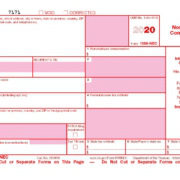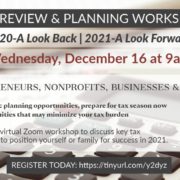Filing Form 1099-NEC Beginning in Tax Year 2020
The IRS has released Form 1099-NEC, a new informational form, that beginning in tax year 2020, will change how entities report miscellaneous payments made to payees. Like any tax law adjustments, it’s important for business owners to go into the filing process armed with as much information as possible to avoid fees and penalties.
Here’s what you need to know now to be prepared for filing the correct forms relating to these miscellaneous payments.
Who Needs to File
As in years past, certain entities have to file a Form 1099 if they made payments in their trade or business, and the payments made to a single payee were $600 or more.
The following entities are required to file 1099’s:
- Businesses and self-employed individuals
- Nonprofits
- Trusts of qualified pension or profit-sharing plans of employers
- Certain organizations that are exempt from tax under section 501(c)
- Farmers’ cooperatives that are exempt from tax under section 521
- Widely-held fixed investment trusts
- Federal, state, and local government agencies
Who Does Not Need to File
You are not required to file a 1099 form if:
- You are not engaged in a trade or business. Personal payments to someone mowing your lawn, completing repairs at your house, for the purchases of goods, etc., does not necessitate a 1099 filing.
- You are engaged in a trade or business, and the payment was made to another company that is incorporated, and it wasn’t for medical or legal services.
Also, as a reminder, if you are engaged in a trade or business and the sum of all payments made to a single person or unincorporated business is less than $600 in any given calendar year, you do not need to file.
What Form Needs to be Filed
The IRS decided to create a new form for payments made for nonemployee compensation after it caused confusion by changing the filing deadline for these types of payments (Box 7 on Form 1099-Misc) to January 31st. This caused two different filing deadlines for the same form, and many businesses were fined for missing the January 31st deadline. The new form to report any nonemployee compensation is now Form 1099-NEC.
Non-employee compensation includes fees, commissions, prizes and awards, and any other forms of compensation for services performed by someone who isn’t classified as your employee. Also included as nonemployee compensation is oil and gas payments for a working interest and expenses incurred for the use of an entertainment facility that you treat as compensation.
If you have these types of payments, you are required to file a Form 1099-NEC if:
- You paid someone who is not your employee
- You paid for services in the course of your trade or business
- You paid an individual, partnership, estate
- You paid a corporation for medical or legal services
- You paid at least $600 to a single payee in a single calendar year
Form 1099-NEC is due to both the IRS and the payees by February 1st.
You will continue to use Form 1099-MISC for if you made payments of at least $10 in royalties or broker payments in lieu of dividends and tax-exempt interest or at least $600 in:
- Rents
- Prizes and awards given to people that are not for payments made for services
- Other income payments
- Medical and health care payments
- Cash paid from a notional principal contract to an individual, partnership, or estate
- Fishing boat proceeds
- Crop insurance proceeds
- Payments made to an attorney in connection with legal services but not for the attorney’s assistance
- Nonqualified compensation
Also, you must use Form 1099-MISC to report that you made direct sales of $5,000 or more of consumer products to a buyer for resale anywhere other than a permanent retail establishment.
Filing Form 1099-Misc must be done by March 1st if filing by paper, or by March 31st if filing electronically. You must provide the payee a copy of the statement by February 1st.
Contact Leone, McDonnell & Roberts Today
The end of the year is rapidly approaching! It is essential to spend some time in the last few weeks of 2020 to determine what type of payments you made to prepare the correct form by the valid due date. Please do not hesitate to contact us if you have any questions navigating the new form’s filing.










